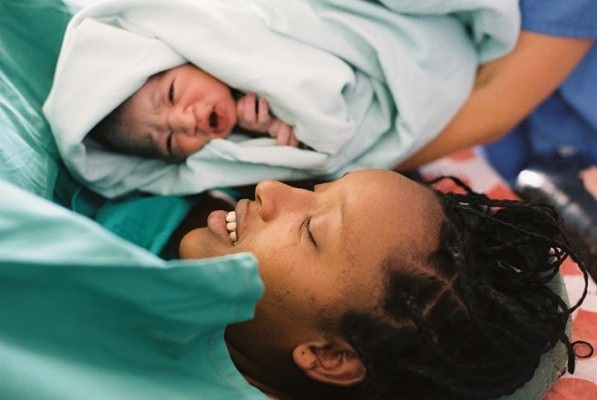March 23rd
I have only 48 hours until I leave Gimbi on the first leg of my journey home and so I am trying to collect statistics for my time here and finish off other bits and pieces- it suddenly feels a bit like being at King's with too much to do and too little time. Perhaps as I am coming to the end of my time, I am also starting to dwell more on some of the problems that I leave behind and on thoughts about how these can be addressed in the future.
This blog is written with Emma who is one of our midwives at King's who (assuming my blog so far hasn't put her off) is keen to volunteer with Maternity Worldwide and come to Gimbi (and of course also for any other midwife who wants to do some time abroad) in mind as it will to give her some idea of the challenges she will face and why she has invaluable training/experience that she can pass on.
The midwives here are not in reality midwives although throughout my blog I have called them this and on a day-to-day basis everyone in the hospital calls them midwives as well. To be entirely correct they are Skilled birth attendants (SBA) all of them were Ethiopian qualified nurses (this technically requires a 3-year course taught in English but as previously described the standard of courses can vary hugely from institution to institution) who have undergone an additional 9-month in service training to be allowed to work as SBA. To be a midwife in the UK the training is much longer & more intensive (a minimum of two years full time which includes a lot of supervised practice) training and in addition to this the educational qualifications of those entering midwifery training is much higher than here (they now require a degree). The SBA training was all organised by Maternity Worldwide and there is a need to keep running such training to keep the numbers of Skilled birth Attendants at a level that allows the 24-hour rota on the labour ward to be maintained.
Although the training is relatively brief the midwives (I will continue to use this term due to habit) are amazing in the things that they are able to do. Since I have been here I have never been asked to do any perineal suturing (they even expect to suture for my deliveries which I have refused as I believe the person who cuts an episiotomy should suture it-helps reflection on whether such a large one was really necessary!). They manage a large proportion of vaginal deliveries without any involvement of the medical staff even doing straightforward vacuum (Ventouse) deliveries, which in the UK are always done by doctors. They are good at resuscitation of babies when required, put up all the drips (I've done 3 since I've been here) and are happy giving intravenous injections of anything that is prescribed. They have had the need for monitoring vital signs (another terrible Americanism I will need to try to forget when I get back to the UK and start doing observations again) drilled into them and generally do this well and report any abnormality such as raised blood pressure in labour promptly which makes a significant contribution to reducing maternal morbidity and mortality.
So this is the positive bit-is there a down side? Sadly any sort of pastoral care as part of midwifery has yet to reach Ethiopia. The women labour alone without any relative or support in labour and there is no analgesia (Pethidine is available but due to the depression it can cause in the neonate and the cost constraints (a single dose costs about 50burr=£2.50) it is rarely used) but in spite of this the midwives do not see their role is to offer any support either by verbal reassurance or explanation or by physical actions such as holding a hand or rubbing a back (I do a lot more of this than they ever do). Fortunately the fortitude of women here is a marvel and most labour without complaint (I am told that as a very god-fearing nation pain is generally considered as "god-given" and thus if god does not see fit to cure it, then it must be borne without complaint), they appear relaxed and this shows in the labour progress of the majority which is fast- I find their apparent lack of fear amazing given the extreme hazard that childbirth presents to women here (they all must know of friends and relatives who have died in childbirth). In fact the occasional woman who does behave as many women would in the UK without pain relief, support or reassurance (crying out in pain during a contraction and being fearful of the next contraction in between times) will result in multiple calls for medical assistance and thus depending on the threshold of the Obstetrician a high chance of caesarean section.
Women all deliver flat on their backs again a source of amazement to me as it seems unlikely that this is what women would do if they were at home in the care of a traditional birth attendant. I have questioned this but sadly got nowhere in making any change in practice.
Help with breast-feeding is almost non-existent with a belief amongst midwives that women should be able to do this unaided. Thankfully women here are fantastic at breast feeding helped by their excellent skin, culturally it is expected and the incentive that formula feeding is too expensive for them even to contemplate (Nestlé's brand Nan is the equivalent of $10 per small tin) so that for their baby to survive breast feeding must be established. However some of them do struggle in spite of this and getting help is difficult (I know a lot more about breast-feeding now than when I left the UK).
English can also be a problem as the skill varies and there can be misunderstandings. I remember one night when I was reviewing a baby who was struggling in the first few hours of life in spite of being in good condition initially at birth. I was wondering about the possibility of some sort of congenital abnormality such as a heart defect when the midwife helping me said, "babies mother is sister". Immediately the complications of births that result from incestuous relationships flooded through my mind although fortunately I said nothing but perhaps the look on my face led the midwife to offer clarification by adding "she works on male ward" leading me to a rapid realisation that we were dealing with a nursing sister rather than the sibling variety. On a simpler level the communication issues can result in orders being followed slowly or not at all with the obvious potential consequences on patient care.
Sadly the most serious issue is that the very high perinatal mortality rate creates a casual attitude to fetal monitoring. We are not able to monitor continuously so rely on the midwives to listen in on the baby during the labour. Just this week I was called to a labour (the guard has to come to my house to tell me as we have no phones or pagers and no message of any particular urgency was sent) and when I arrived the midwives told me that they thought the baby had died in labour. They showed no concern, remorse or fear of being chastised for this possible outcome which when I delivered the baby immediately (and very easily) with the vacuum proved to be the case with a fresh stillbirth of a beautiful full-grown baby. On reviewing their monitoring they had not listened to the heartbeat for over half an hour despite other signs that there might be problems. Although I try hard not to be angry they were aware that I was not happy but all I was offered were excuses although eventually I managed to get them to reflect on things that they can learn to prevent this happening in future deliveries.
I have been working with Marie who is a very experience midwife from Denmark. She is trying hard to set an example to the local "midwives" by offering support to a labouring mother by simple things like walking around with her, rubbing her backs through contractions and holding her hand- seemingly very simple things. She has already made herself popular with the anaesthetist who has noticed that the women she is caring for are calmer when they go to theatre and thus easier to anaesthetise- all this in spite of the fact that Marie speaks only occasional words of Oromifa (the old adage that actions speak louder than words coming immediately to mind).
So I believe that the skills of a western trained midwife are exactly what Gimbi needs (Marie is here for a long stint but this finishes in November and there is plenty of work for two anyway). Because the deficiencies in the practice of the skilled birth attendants ofteninvolve cultural attitudes, formal teaching has limited effect and what they really need is to see a good midwife practising and to learn from this example. Progress will be slow but will be there and for the individual women fortunate enough to be cared for by an empathic midwife the benefits will be immediate.


No comments:
Post a Comment